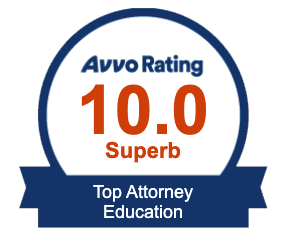In my experience, the largest percentage of children that I represent are diagnosed with ADHD or ADD. Most children may be diagnosed only with ADHD, but some children have a dual diagnosis of autism and ADHD, Tourette’s Syndrome and ADHD, Bi-Polar Disorder and ADHD, and so forth. This is called a co-morbid disorder. In other words, there are some mental disorders that are common with other disorders such as ADHD and Oppositional Defiant Disorder (ODD) or Conduct Disorder. Did you know that approximately 20%-40% of all children with ADHD also have a specific learning disability? Many studies on this issue reveal that children with ADHD also have some type of specific learning disability as well. Why is this important? When a child who is suspected of ADHD or ADD, the school system should consider assessing the child for a specific learning disability depending on other signs or symptoms. Of course, not every child that is diagnosed with ADHD also has a specific learning disability. But you should at least be on notice there is a high percentage of children with ADHD that also have a specific learning disability. And some of the symptoms of ADHD may overlap with some of the symptoms of a specific learning disability. For instance, a child with ADHD may have fine motor control deficits. A child with a specific learning disability may have dysgraphia or other deficits in handwriting.
Suffice it to say that every child with ADHD has common issues with other children with ADHD; but each child with ADHD also has strengths and weaknesses that are unique to that child. No all children with ADHD exhibit overt hyperactivity. Of course, children diagnosed with ADD typically do not exhibit heightened hyperactivity or any hyperactivity at all. ADHD is not monolithic, which means you cannot assume children with ADHD all have the same symptoms and educational deficits. They do not. Some children have milder symptoms of this disorder while others have more severe symptoms. For those children with mild symptoms of ADHD, they may not qualify for special education and related services at all. They may not have a disability that adversely affects their educational performance and are in need of special educational related services. If so, these children will not have an IEP but rather they may qualify for an accommodations or Section 504 Plan. To qualify for a Section 504 Plan, a child with ADHD has to show that he has a disability that significantly limits one or more major life activities. In July 2016, the Office of Civil Rights, Department of Education, issued a very important memorandum on school system’s responsibilities to locate, identify, evaluate and provide a free appropriate public education for children with ADHD. See https://www.ed.gov/news/press-releases/us-department-education-releases-guidance-civil-rights-students-adhd. This is a very helpful and important memorandum on ADHD. You can find a good summary of this memorandum at http://www.jdsupra.com/legalnews/office-for-civil-rights-issues-new-dear-97699/
You can find numerous resources and links on special education and ADHD. See http://journals.sagepub.com/doi/abs/10.1177/074193259501600106 The more you read and learn about your child’s ADHD and his rights under special education laws, the better prepared you will be to deal with his special education needs. Again, it is important to note that all of the suggestions you may read about for children with ADHD may or may not apply to your child. You should be careful to use only those suggestions that will help your child. One way to be sure that you know what special education and related services may need is to secure a competent and extensive psychoeducational evaluation. Such an evaluation is a building block to create an appropriate educational program for your child. There are so many other areas to cover for a child with ADHD and I will address some of them in my posts for the upcoming months.

